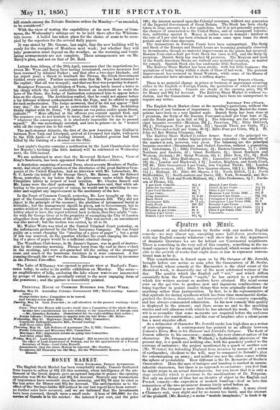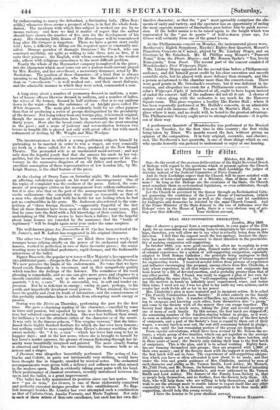gOatrts gulf Zitsit.
A contrast of any chef-d'amwe by Scribe with any modern English comedy—we may almost say, excepting some half-dozen productions, with any English comedy whatever—will show that in this department of dramatic literature we are far behind our Continental neighbours. There is something in the very soil of this country, something in the na- tional exigency for the strong and plainly-marked, which seems unfavour- able to the growth of works that ought more or leas to represent conven- tional man as he is.
This consideration is forced upon 'us by The an'spme of Mr. Jerrold, brought before our nodose so soon after the thmaraderie of K. Scribe. Mr. Jerrold, whose comedy at the Haymarket is the chief event of the theatrical week, is deservedly one of the most celebrated writers of the day. The quality which the English call " wit," and which differs essentially from the French " esprit," he has carried to a perfection which few writers ancient or modern have attained. His mind seems ever on the qui vice to produce .new and ingenious combinations—to bring together in quaint similes things that were originally destined for anything rather than juxtaposition. In fact, he is the representative of that aptitude for daring synthesiewhieh has from time immemorial distin- guished the divines, dramatists, and humourists of this country especially, and has always commanded admiration. In his new emnedy this quality is displayed 'to the utmost ; and -them seems no end to the sparkling similes 'and odd allusions with which he has adorned his work. Often his wit is so recondite 'that some moments are required before the audience can perceive the combination ; and the roar of laughter after a silent pause has a most singular effect.
As a delineator of character Mr. Jerrold ranks less high than as a writer of pure epigrams. A contemporary has pointed to am affinity between Jonson's Every Kan in his Hamar and Jenold's Caispate. The fault of Jenson adheres to his euccessee—namely, the very abstract nature of his characters, Dr. Petgoose, (Mr. Wallaek,) a fashionable physician of the present day, is a quack and nothing else, with his quackery periled to the extreme of caricature : the project mentioned by a quack of another sort (Mr. Webster) for defending England from invasion by means of a serial of earthquakes, obedient to the will, may be compared to llobadif s plan for exterminating an army ; and neither one nor the other comes within the sphere of probability. How different is the Dr. Bernardet of Scribe's Clasnaroderie. Here the man of intrigue and humbug is marked in unmis- takeable characters, but there is no approach to caricature : you feel that he might reign in an actual drawingrocan, but you know that iris only stage credulity which is pervious to the machinations of Dr. Petgooae. 'Not only an accident of time but an identity of object in the English and 'French comedy—the exposition of modern humbug—lead us into this nomparison of the two prominent dramas lately acted before us. In plot The asftpase is more than ordinarily defective. A story about a Chancery suit, wry slight and by no moans too lucid, and the attempt of the plaintiff, (Mr. Keeley,) a mean " mak& imaginaire," to hush it ap by endeavouring to many the defendant, a fascinating lady, (Miss Rey- nolds,) whenever there seems a prospect of loss, is in fact the whole foun- dation. The incidents with which this subject is worked out are by no means various : and here we find it matter of regret that the author should have chosen the number of five acts for the development of his story. His charming little drama of The Housekeeper will be remembered long after The Catspaw is forgotten. There we have a pretty story easily told ; here, a difficulty in filling out the required space is constantly ma- nifest. Strange paradox of dramatic literature ! the French, who can construct anything, are quite as willing to take three acts as five, if it suits their purpose ; the English, with whom construction is the weakest aide, adhere with religious earnestness to the most difficult problem.
Nearly the whole of the Haymarket company is employed in the piece ; but the characters which most come out are a jealous maid-servant played by Mrs. Keeley, and her sweetheart, a mercenary drummer, acted by Mr. Buckstone. The position of these characters—of a kind that is always amusing to an English audience, who from the Haymarket to Astley's doat on "sweethearts "—is well worked out ; and their smart dialogue, and the admirable manner in which they were acted, commanded a roar.



























 Previous page
Previous page